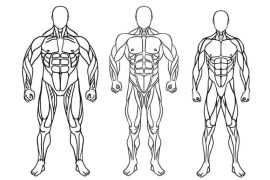Muscle loss, often referred to as sarcopenia, becomes more noticeable around middle age due to several factors. Firstly, there’s a natural decline in muscle mass and strength as we age, starting as early as our 30s and accelerating around age 50. This decline is influenced by hormonal changes, particularly a decrease in testosterone and growth hormone levels, which are crucial for maintaining muscle mass.
Additionally, lifestyle factors such as reduced physical activity and poorer diet can contribute to muscle loss. Inadequate protein intake or absorption, along with chronic illnesses like diabetes or cardiovascular disease, can also exacerbate sarcopenia. Lastly, decreased nerve function can impair muscle activation and contribute to muscle atrophy. To counteract these effects, resistance training, adequate protein intake, and overall healthy lifestyle choices are recommended to preserve muscle mass and strength as we age.
As we age, several factors contribute to the natural decline in muscle mass, a process known as sarcopenia. Here’s a breakdown of why this happens and effective strategies to maintain muscle strength:
Key Factors Contributing to Muscle Loss:
- Hormonal Shifts: With aging, there’s a decrease in testosterone and growth hormone production, essential for muscle maintenance and growth. Women undergoing menopause also experience declining estrogen levels, which can further impact muscle health.
- Reduced Physical Activity: As we age, we tend to become less active. This lack of physical activity leads to muscle atrophy (“use it or lose it”), where muscles shrink due to disuse.
- Metabolic Changes: Aging often brings about a slower metabolic rate, which can disrupt the balance between muscle protein breakdown and synthesis, potentially leading to muscle loss.
- Neuronal Decline: Gradual loss of motor neurons, responsible for muscle movement and strength, contributes to decreased muscle function over time.
- Chronic Inflammation: Low-grade inflammation, which tends to increase with age, can also negatively affect muscle mass and function.
Strategies to Combat Muscle Loss:
- Regular Exercise, Especially Strength Training: Engaging in regular physical activity, particularly resistance or strength training exercises, is crucial. Strength training stimulates muscle growth and helps maintain muscle mass and strength.
- Optimal Protein Intake: Protein is essential for muscle repair and growth. Ensure your diet includes adequate protein, especially from sources like lean meats, fish, eggs, dairy, legumes, and plant-based proteins. Consuming protein after exercise can support muscle recovery.
- Balanced Diet: A nutritious diet rich in vitamins, minerals, and antioxidants supports overall health, including muscle function. Aim for a variety of fruits, vegetables, whole grains, and healthy fats to provide essential nutrients.
- Diverse Physical Activities: Incorporate cardiovascular exercises and flexibility training alongside strength training to maintain overall fitness and mobility.
- Adequate Rest and Recovery: Allow sufficient time for muscles to recover between workouts. Quality sleep and relaxation are essential for muscle repair and growth.
- Consider Hormonal Therapies: In some cases, hormone replacement therapy may be recommended to address specific hormonal deficiencies contributing to muscle loss. Consult with a healthcare professional to explore this option.
By understanding the reasons behind muscle loss and implementing these strategies, you can effectively combat sarcopenia and maintain muscle strength as you age. A holistic approach that includes regular exercise, a balanced diet rich in protein and nutrients, adequate rest, and possibly hormone management, can significantly support your efforts to preserve muscle health and overall vitality throughout life.
Disclaimer:
The information contained in this article is for educational and informational purposes only and is not intended as a health advice. We would ask you to consult a qualified professional or medical expert to gain additional knowledge before you choose to consume any product or perform any exercise.







